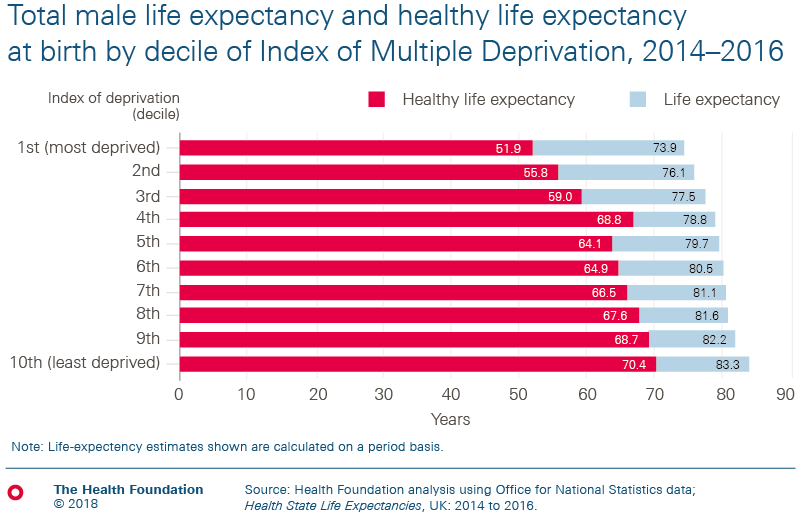The gap in healthy life expectancy between the most and least deprived areas in England

Key points:
- Between 2014 and 2016, men from the most-deprived tenth of areas in England were expected to live almost 19 fewer years in good health than people from the least-deprived tenth of areas.
- The government’s vision for the role of prevention in improving health includes ensuring a 5-year increase in healthy life expectancy by 2035 and, in doing so, closing the gap between the most and least deprived.
- Good health has a significant influence on overall wellbeing. It allows people to participate in family life, the community and the workplace. It has value in its own right and it also creates value. Health should be viewed as an asset that is worth investing in for our society to prosper.
A recent Health Foundation briefing makes the case for the nation’s health to be viewed as an asset that requires long-term investment for our society to prosper. It also describes a £2m research programme, funded by the Health Foundation, that will assess the effect of an individual’s health on their social and economic outcomes.
The government measure of the relative deprivation of areas within England is known as the Index of Multiple Deprivation. It considers seven domains: income; employment; education, skills and training; health; crime; barriers to housing and services; and living environment.
Between 2014 and 2016, men from the most-deprived tenth of areas in England were expected to live almost 19 fewer years in good health than people from the least-deprived tenth of areas. This disparity in health outcomes is strongly correlated with the conditions in which people live.
This relationship is not new, but as the UK’s population ages the consequences are becoming more apparent. The government’s vision for the role of prevention in improving health supports the ‘ageing society grand challenge’ of the UK government’s Industrial Strategy: ensuring a 5-year increase in healthy life expectancy by 2035 and, in doing so, closing the gap between the most and least deprived.
A workforce that remains fit, healthy and working for longer can both increase tax revenues and decrease the costs of supporting an ageing society. However, health inequalities undermine these benefits. By 65 years of age, twice as many men from the most-deprived fifth of areas in England and Wales (21%) will have died as men from the least-deprived fifth (9%), reducing the size of the available workforce.
Further reading
Work with us
We look for talented and passionate individuals as everyone at the Health Foundation has an important role to play.
View current vacanciesThe Q community
Q is an initiative connecting people with improvement expertise across the UK.
Find out more


